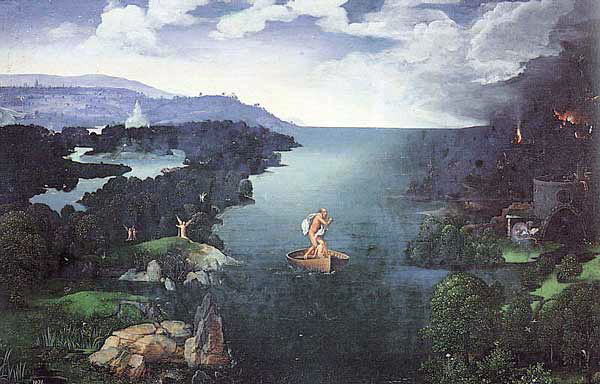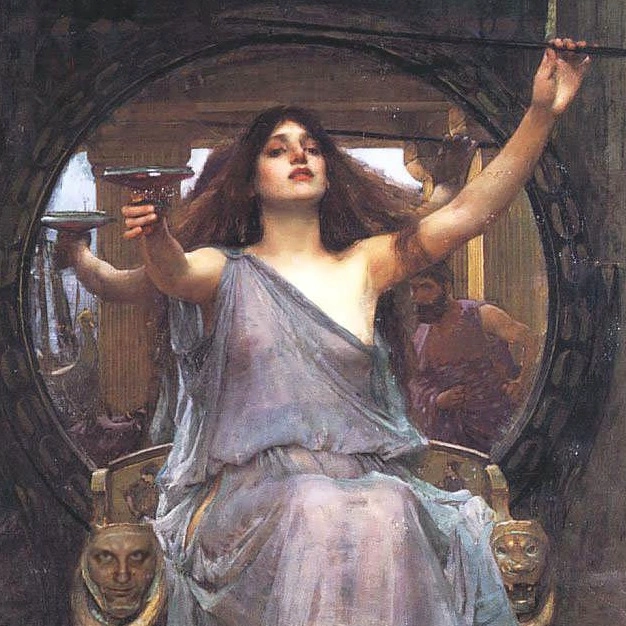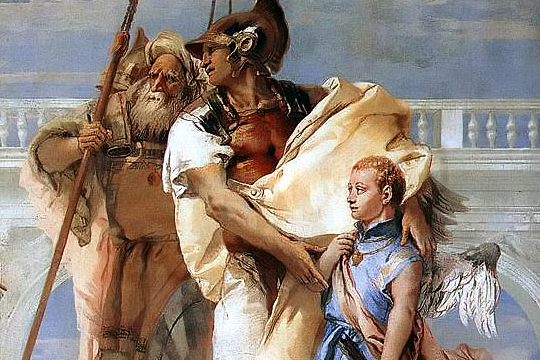[dropcap]O[/dropcap]dysseus finally returns home in Book XIII of the Odyssey, but “could not tell what land it was / after so many years away … The landscape looked strange, unearthly strange / to the Lord Odysseus” (XIII. 238-39, 245-46). Odysseus spends the next seven books carefully making his way around Ithaka, making allegiances, and practicing his trademark dissembling and contending in order to insinuate himself into the presence of the suitors to make them eventually “atone in blood!” (XI.132). The lessons of the voyage must come into play if Odysseus is to reclaim his house and kingdom so that he may set his lands in order and finally put the chaos of this wanderings behind him. Book XXI sets the stage for the slaughter of Book XXII. Telemachus has finally accepted Odysseus as his true father and now stands beside the returned king at the end of Book XXI: Odysseus has cast aside his beggar’s rags and now stands regally before the doomed suitors, bow in hand, son by his side, and electrical effects from the gods themselves. You couldn’t ask for anything better out of Hollywood.
The first to take an arrow is Antinoos. At the point that Odysseus finally reveals himself, the suitors had been warned many times and in many ways to vacate the house of Odysseus, so the intensity has been building since Odysseus has returned home: the suitors will soon pay for their perfidy with their blood — nothing they can do will now will save them as book XXII begins with the death of the arrogant and somewhat dense Antinoos.
Book XXII parallels book XXII of the Iliad: the deciding battles in both epics are decided. The Odyssey book XXII reads stylistically similar to the Iliad book XXII: notice the Homeric, or epic, similes of war (cf. ll. 337-43 for an example); the brutality of war is not disguised with florid romanticism — Odysseus shows no mercy as deals out death to the suitors and those who supported them. He has come by stealth and now uses combat to rid his home of the infection. Part of that infection are the twelve maids that helped the suitors by betraying Penelope. Since those maids are part of Odysseus’ own house, they meet a particularly brutal end — only after they clean the carnage of the great hall — as does Melanthios. These descriptions are disturbing, but suggest that one’s house is a sacred place as is one’s duty to that house. After the traitors have been dealt with and the hall cleansed, Odysseus meets Penelope for the first time in twenty years in book XXIII.
She is, at first, dubious that Odysseus has truly returned. Shrewd like her husband, she does not allow herself to believe Eurykleia’s report that the suitors are now dead by the hand of the returned king. Penelope vacillates between hope and disbelief, but she agrees to see “that strange one who killed” the suitors (XXIII.91), for indeed he is a stranger after being gone for so long:
And [Penelope], for a long time, sat deathly still
in wonderment—for sometimes as she gazed
she found him—yes, clearly—like her husband,
but sometimes blood and rags were all she saw. (XXIII.105-109)
This aged and silent man in front of her is both Odysseus and he is not, perhaps commenting on the theme of disguise and that runs thgroughout the Odyssey, finally, once and for all, asking the question who is the true Odysseus? as he confronts his wife after twenty years. How does one know that truth, especially from a master of lies? There are ways to test.
Even as Odysseus goes about his kingly business of keeping the suitors’ families at bay, Penelope remains chary and distant. He addresses her as “strange woman” and she returns, mocking him, “strange man” and begins her test by asking Eurykleia to set up Odysseus’ bed outside of his bedchamber. Odysseus readily passes the test, but not before he gets upset. The bed cannot be moved: it is part of a living, growing olive tree — it cannot be moved without destroying it. This becomes a potent metaphor for the marriage of Penelope and Odysseus as the foundation of the Odysseus’ kingdom and his patriarchal order imposed on nature. It also suggests that their marriage is as close to natural as humans can get — as close to the perfection of marriage that is possible in this world: a devoted wife that will endure any hardships to uphold her marriage commitment to her husband. Seemingly, this devotion only flows in one direction, as Odysseus has spent much of his time away shacked up with Circe and Calypso.
While Odysseus and Penelope are again united, however briefly, Odysseus still has the task before him of placating the parents of the suitors that he just slaughtered. This becomes the primary task of the problematic book XXIV. I’ve always disliked this book that ends with a deus ex machina, suggesting that Odysseus truly did not learn anything on his nostos. The book opens with the suitors’ souls entering the Underworld, and a chat between Agamemnon and Achilles — we’ve come full-circle, for the Iliad began with the contention between the two Achaeans, but now they carry on like two old drinking buddies: Agamemnon still complaining about Clytemnestra and implicating all women in his archetypal disdain for their glib loyalties, even though Penelope provides as example that does not agree with his stereotype. I guess that once you’re dead, you can’t learn any different.
After some words by the two dead heroes who didn’t have much time for the dead suitors, the action shifts back to Ithaca, where Odysseus has chosen to disguise himself in order to fool his father, Laertes. Typical of Odysseus, he approaches Laertes in order to test him (disguised as “Quarrelman” — OK, Nobody was clever, but Quarrelman?), yet atypical of Odysseus he has no ostensible reason to. Why is he testing this poor man with “sharp words” other than to “trouble him” (XXIV.265)? This whole exchange makes little sense to me, nor does that scene that follows.
It seems that Odysseus is ready to do battle once again with the fathers of the slain suitors, many of whom seem as pig-headed and dense as their sons. Even though Athena urges them to “let matters rest,” half of the mob decides to assert their vengeance on Odysseus. Stupid stupid men. As the men approach, Odysseus and company are ready to fight again. Only Athena — appearing in her true form? — is able to stop them with a divine sanction: “Now hold!” / she cried, “Break off this bitter skirmish; / end your bloodshed, Ithacans, and make peace” (XXIV.592-94). Yet, Odysseus does not listen! He starts to attack, and Athena has to remind him to command himself: “Call off this battle now, / or Zeus who views the wide world may be angry” (XXIV.608-09). Dude, remember, you pissed off Poseidon and look what happened; do you really want to do the same with Zeus? Has Odysseus learned nothing? I always feel short-changed after reading book XXIV; I think the epic should have ended with the last book, the reunion of Odysseus and Penelope, as that brings the action of the world, through the kingdom, back to the pith of all foundational relationships: home.
So, where is home, finally? And has Odysseus been successful in coming back? Even though Odysseus must leave again soon to carry the oar to the people who are strangers to the sea, he is destined to die as an old man at home. If an odyssey is a return it also represents that return through growth. In a way, Odysseus can never return home, for he left as a very different person, but does the concept of home then grow by the experiences he has in the world? Perhaps if we are to grow as a species, we must leave the comforts of home in order to re-imagine and return to the familiar by bringing in the different.
A friend of mine recently offered a bit of conventional wisdom: that which is earned means much more than that which is given. In my experience, this observation holds true for most things. In order for the concept of home to be significant, we must discover why it is significant to us individually. Yes, we can stand on the backs of giants for our traditional answer, but that leads to complacency, like the suitors, or we can go out into the world and return with experiences that allow home to mean much more, like Odysseus and Telemachus.
It seems that “home” encompasses that with is both positive and negative about our culture: home allows for shelter from a dangerous world, but it also isolates for that world’s wonders. We can hide behind our NRA memberships cards, blockaded with shotgun in hand against any intruders, or we can open the front door and let in some fresh air. Yes, dropping the drawbridge might allow some evil things in, but those challenges keeps a home worth fighting for and coming home to.








